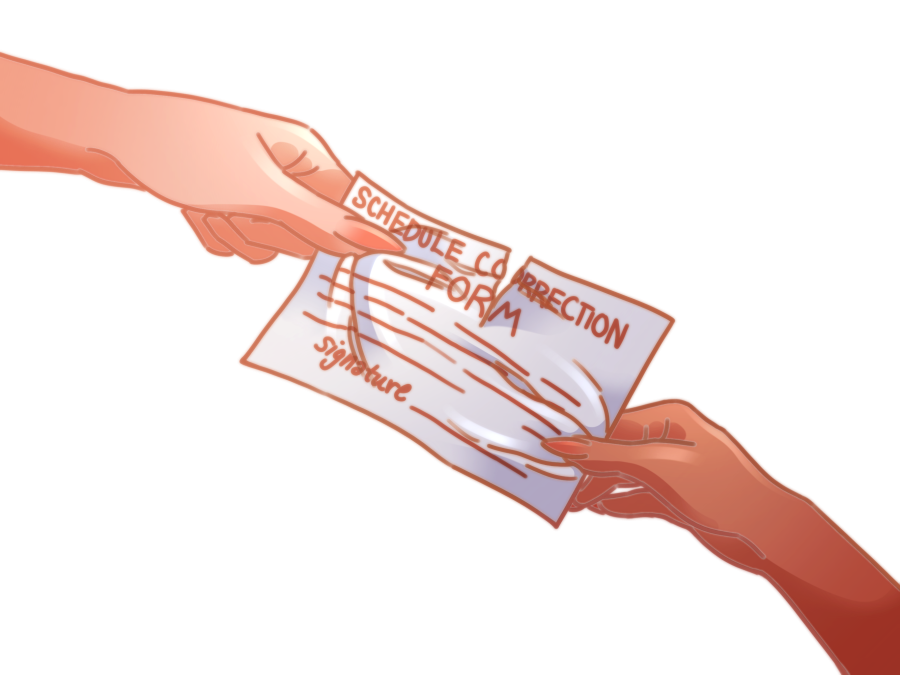When I was handed back the first Algebra 2 Honors math test my sophomore year, I thought the world had come to an end: a fat, red, 59 was scrawled at the top of my paper.
“Stick it out,” was the phrase ingrained in my head by my teacher when I approached them teary-eyed and soul crushed by my academic performance. Pride, pressure and a delusional amount of determination filled me, and I saw no other option other than to stay in the class.
Over time, as I saw the number of students in my class rapidly shrink, “stick it out” became my mantra. Although I ultimately made the decision to stay, it was one of the worst choices I made for myself that year, because I was forcing myself into a shoe that didn’t fit.
Drop deadlines are nearing, and in honors classes, many students think they need to do whatever it takes to stay course and not throw away their potential to succeed. However, this thinking harms students, and teachers often amplify this thought process.
When Brooke Hudacek was a sophomore, she said she enrolled in an honors class that she later wanted to drop. At the time, she had a grade of an A but was having a difficult time keeping up with the rigorous workload.
Before making the decision to tell her teacher, Hudacek said she felt conflicted over her choices.
“I’m a very STEM focused person,” she said. “I need to be in the good science and math classes because that’s what I’m good at. If I laned down, what am I good at now?”
Hudacek eventually talked to her teacher about her struggles, but she said this only prevented her from dropping.
“I wanted to get one of the forms and talk to my parents about it,” she said. “And (my teacher) basically was saying, if you have a certain grade in the class, then I’m not going to sign the form.”
Hudacek said her teacher’s advice was paradoxical: while their refusal to sign her drop form could be perceived as motivational, it also crossed a boundary of her right to self-determination; her teacher should not have made the decision for her to stay in the class.
“On one hand, it was nice to hear my teachers encouraging me,” she said. “But it was about the effort I was putting into it. For how much I was getting out of it, it didn’t feel right to me. Yes, I could probably get an A in this class, if I worked really hard for it and spent a lot of time on it. But was I willing to do that? Not really.”
She never ended up dropping the class.
For students who were raised to believe teachers know better than they, facing opposition from teachers makes an inherently difficult decision even more painful. No one wants to be seen as dumb or incapable or as the student who takes the easy way out.
But dropping a class does not signal a student is not willing to work hard for a good grade. It’s merely a signal a student may not be compatible with a subject and that they want to challenge themselves in different areas.
However, destigmatizing the idea of downlaning a class is not enough. It needs to be praised for being a sign students are able to put themselves first in a high-pressure academic environment, where pushing limits is rewarded and setting limits is condemned.
In reality, the concept of well-roundedness in students is self-destructive. We cannot be good at everything; achieving excellence in every area and taking every advanced class available is virtually impossible.
Students are supposed to fill niches. Our graduating classes should be diverse, filled with future authors, journalists, scientists, athletes, artists and engineers. A monolith of AP Calculus BC students will probably not be the solution to our generation’s most pressing issues.
Taking the pressure off students to take advanced classes in all subjects allows them to use their time and talents efficiently. It allows them to find and fill their niche; students will be able to excel in the areas they are passionate about without wasting time on subjects where the input is simply not worth the output.
So to the students who are currently considering downlaning that one class: yes, it is a good idea.


